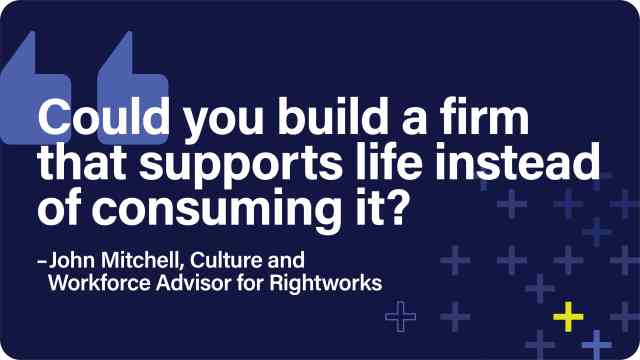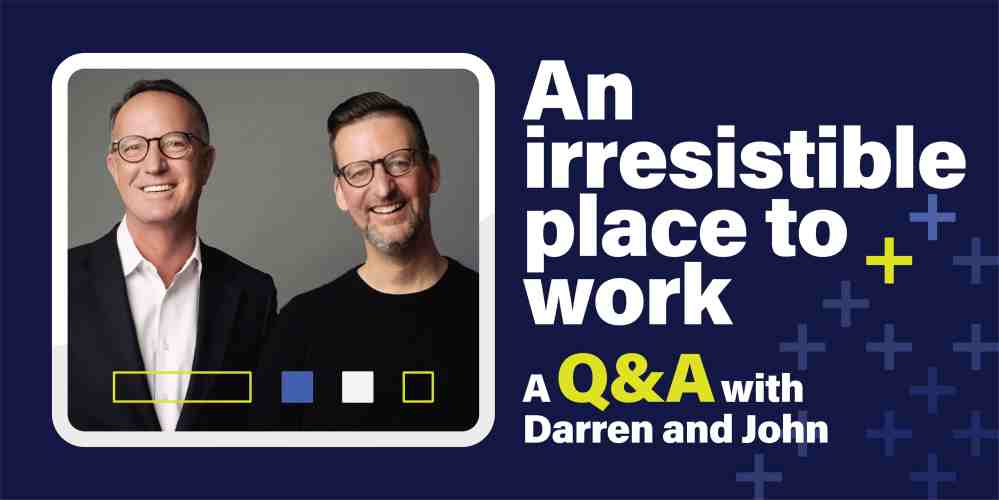As you know, the accounting profession has experienced many changes in staffing over recent years—only to be exacerbated by the pandemic. But what’s at the root of it all? Your accounting firm culture.
If your firm’s culture is teetering on unhealthy—or fell off that cliff a long time ago—there are things you can do to right the ship. And it’s called Smart Team Management.
But what exactly is Smart Team Management?
It’s one of Rightworks Academy’s four “smart” pillars. Think of it as a guide to help you build a healthy and sustainable work environment. One that attracts the new generation of employees while enticing your existing staff to stay.
In one of their recent podcasts, Darren Root and John Mitchell ask each other the tough questions about creating an irresistible place to work. Let’s see what they had to say.
Q: How do you think teams have changed over the years?
John Mitchell: It used to be that you could take for granted that your team would come to work, and we just trusted people to do their work on the honor system. I think those days have come to an end. Now, we understand the market, our responsibility to our clients and what we really mean by “team.” And we understand these things better than we ever have.
Darren Root: I remember the days when I didn’t spend much time thinking about finding new team members or keeping the staff we had. We started questioning if we needed to see people sitting in the office just so we could feel good about their productivity.
Q: What do you believe has changed the most regarding leaders and their teams?

John Mitchell: We’ve found that we needed to create some processes we’d never been forced to create before. And we had to figure out how we’re going to do security and how we’re going to communicate. Traditional firms had management that tried squeezing out all the last drops of their people just to get enough out of them.
But now we’re at a place where we don’t do that. We provide an environment—and a healthy accounting firm culture—where they can be their best.
Q: What’s the number one question you get from firm owners?
John Mitchell: “How do I deal with change?” is the one question that hasn’t changed since I’ve been doing this. When firms create new processes or start instituting a new piece of software, there’s someone who hates everything about it.
Darren Root: Change management is one of the biggest challenges firms are dealing with. I don’t see this slowing down; the rate of change is going to continue. Consider artificial intelligence (AI) and how it’s going to change the way we do daily work. So, change is a big deal.
Q: We talk a lot about an accounting firm’s business model. Why is it so important?

Darren Root: This new generation is expecting something different from the old. As firm owners, we have to reexamine our entire business model and see whether we’re doing the right work, have the right amount of people and whether we’re charging clients enough. Firm owners need to make sure they can support the changing environment.
John Mitchell: Our staff problems and accounting firm culture are driven by a business model. An unhealthy culture is, first and foremost, a business model issue. The way we treat our staff comes from what we expect of them. And an unhealthy business model often comes from a messed-up client base, a lack of product understanding and the way we serve people. We need to provide the tools and resources that help firms build their business model in a way that’s sustainable for human life.
Q: How have business models become so outdated?
Darren Root: It was easy for business models to gravitate toward doing a bunch of tax returns because it was easy to get them. But then, you’ve got all these deadlines and craziness.
John Mitchell: I’ve been calling it the “drift” because it doesn’t happen intentionally. They don’t pay attention to their business model because they don’t have the time. And they end up drifting into something they would never have created on purpose.
Q: Coming back to the resistance of change. What can firm owners do to make transitions easier?
John Mitchell: You have to get control of your business model. The most important thing you can do in your accounting firm is to create a safe place for people to absorb change. Because change is going to happen in your firm—all the time.
Everyone needs to know who we serve, what we do, what products we deliver and how we do it. That’s the business model that provides solid footing for your team to put their trust in.
Darren Root: The framework for Smart Team Management lies in the business model. We have to make sure we’re measuring the right things—and it’s not “butts in seats.” We have to ask:
- Are we measuring productivity in the right way?
- Are we giving people the flexibility to work in new ways?
- How do we set up the IT infrastructure to support all this?
Q: We know that strong accounting firm cultures put people first. But how can firms do this?

John Mitchell: You need someone that you can put in charge who cares about human beings. We call them the Smart Team Manager. This is the person—who probably already exists in your firm—who likes to plan parties, thinks about birthdays and remembers the people before the work.
Find this person in your firm and elevate them. They can think about the people and the relationships. And they can help point your firm in the direction where people matter most.
Q: We can’t talk about firm culture without mentioning employee mental health. What are the firm’s responsibilities when it comes to mental health?
John Mitchell: You have to set boundaries around this. You may want to fix someone’s mental health, but it’s not your job. And if you try, it will be to the detriment of the rest of your team. An employee’s mental health is their responsibility. For firms, mental health becomes about facilitating someone getting help—not about creating a place where they can get help at work.
Q: Any key takeaways about Smart Team Management and an irresistible accounting firm culture?
Darren Root: It’s all connected to your business model.
John Mitchell: The two most important things in your firm? Your client base and your team—that’s your people.
Be irresistible
We can’t say it enough: People matter most.
Learn how to create a healthy accounting firm culture and start these three habits today!



